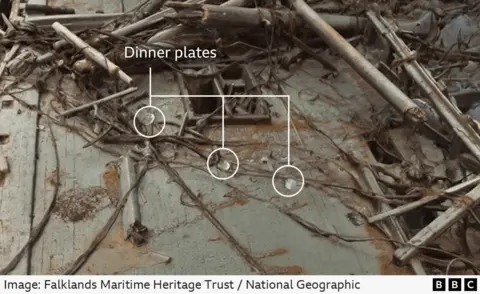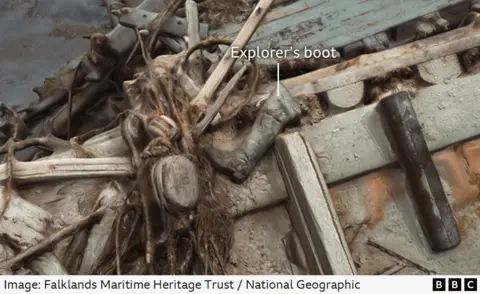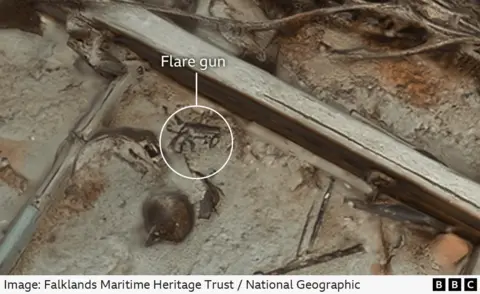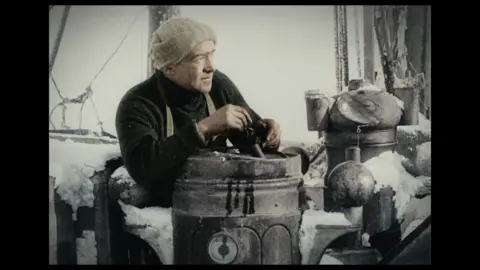The new 3D scan lifts the veil of darkness and water from the wreck lying 3km beneath the surface
After more than 100 years hidden in the icy waters of Antarctica, Sir Ernest Shackleton’s ship Endurance has been revealed in extraordinary 3D detail.
For the first time we can see the vessel, which sank in 1915 and lies 3,000m down at the bottom of the Weddell Sea, as if the murky water has been drained away.
The digital scan, which is made from 25,000 high resolution images, was captured when the ship was found in 2022.
It’s been released as part of a new documentary called Endurance, which will be shown at cinemas.
The team has scoured the scan for tiny details, each of which tell a story linking the past to the present.
In the picture below you can see the plates that the crew used for daily meals, left scattered across the deck.

 Falklands Maritime Heritage Trust / National Geographic
Falklands Maritime Heritage Trust / National Geographic
In the next picture there's a single boot that might have belonged to Frank Wild, Shackleton’s second-in-command.

 Falklands Maritime Heritage Trust / National Geographic
Falklands Maritime Heritage Trust / National Geographic
Perhaps most extraordinary of all is a flare gun that’s referenced in the journals the crew kept.

 Falklands Maritime Heritage Trust / National Geographic
Falklands Maritime Heritage Trust / National Geographic
The flare gun was fired by Frank Hurley, the expedition's photographer, as the ship that had been the crew’s home was lost to the ice.
“Hurley gets this flare gun, and he fires the flare gun into the air with a massive detonator as a tribute to the ship,” explains Dr John Shears who led the expedition that found Endurance.
"And then in the diary, he talks about putting it down on the deck. And there we are. We come back over 100 years later, and there's that flare gun, incredible.”
A doomed mission
Sir Ernest Shackleton was an Anglo-Irish explorer who led the Imperial Trans-Antarctic Expedition, which set out to make the first land crossing of Antarctica.
But the mission was doomed from the outset.
Endurance became stuck in pack ice within weeks of setting off from South Georgia.
The ship, with the crew on board, drifted for months before the order was eventually given to abandon ship. Endurance finally sank on 21 November 1915.
Shackleton and his men were forced to travel for hundreds of miles over ice, land and sea to reach safety - miraculously all 27 of the crew survived.
Their extraordinary story was recorded in their diaries, as well as in Frank Hurley's photographs, which have had colour added for the Endurance documentary.

 BFI/Frank Hurley
BFI/Frank Hurley
Sir Ernest Shackleton aboard the Endurance - now in colour
The ship itself remained lost until 2022.
Its discovery made headlines around the world - and the footage of Endurance revealed that it is beautifully preserved by the icy waters.
The new 3D scan was made using underwater robots that mapped the wreck from every angle, taking thousands of photographs. These were then “stitched” together to create a digital twin.
While footage filmed at this depth can only show parts of Endurance in the gloom, the scan shows the complete 44m long wooden wreck from bow to stern - even recording the grooves carved into the sediment as the ship skidded to a halt on the seafloor.
The model reveals how the ship was crushed by the ice - the masts toppled and parts of the deck in tatters - but the structure itself is largely intact.
Shackleton’s descendants say Endurance will never be raised - and its location in one of the most remote parts of the globe means visiting the wreck again would be extremely challenging.
But Nico Vincent from Deep Ocean Search, who developed the technology for the scans, along with Voyis Imaging and McGill University, said the digital replica offers a new way to study the ship.
“It's absolutely fabulous. The wreck is almost intact like she sank yesterday,” said Mr Vincent, who was also a co-leader for the expedition.
He said the scan could be used by scientists to study the sea life that has colonised the wreck, to analyse the geology of the sea floor, and to discover new artefacts.
“So this is really a great opportunity that we can offer for the future.”
The scan belongs to the Falklands Maritime Heritage Trust who also funded and organised the expedition to find Shackleton’s ship.
The Endurance documentary is premiering at the London Film Festival on 12 October and will be released in cinemas in the UK on 14 October.
Additional reporting Kevin Church

 Movie
Movie 2 months ago
76
2 months ago
76 






![Presidents Day Weekend Car Sales [2021 Edition] Presidents Day Weekend Car Sales [2021 Edition]](https://www.findthebestcarprice.com/wp-content/uploads/Presidents-Day-Weekend-car-sales.jpg)



 English (United States)
English (United States)